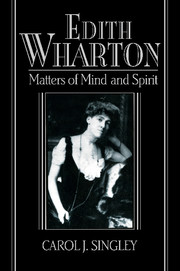5 - Platonic Idealism
Published online by Cambridge University Press: 06 August 2010
Summary
The world is a welter and has always been one; but though all the cranks and the theorists cannot master the old floundering monster, or force it for long into any of their neat plans of readjustment, here and there a saint or a genius suddenly sends a little ray through the fog, and helps humanity to stumble on, and perhaps up.
Edith Wharton, A Backward GlanceAdopting the Platonic dialogue, with all its archaeological formulae, seems to me enough to petrify or ossify any drop of new blood or morsel of live flesh & bone.
Edith Wharton, Letter to Margaret ChanlerEdith Wharton continued her search for spiritual meaning in the post–World War I years. In previous novels, she wrestled with questions of spiritual meaning and sought alternatives to the Christian mindbody split and prohibitions on the flesh. Old Testament teachings and Calvinist doctrines influence The House of Mirth and Ethan Frome; the wisdom and creativity of the ancient deity Sophia echo in The Reef; and Emerson's and Whitman's transcendentalism provide the inspiration for Summer. In The Age of Innocence, Platonic philosophy offers Wharton another base from which to explore familiar and haunting questions about love, duty, and spiritual values.
Although the heroine of Summer cannot realize the full potential afforded by Emersonian transcendentalism, Wharton herself continued to privilege Emerson's ideals, focusing, in particular, on the Platonic philosophy that informed his and other romantic theories of the nineteenth century.
- Type
- Chapter
- Information
- Edith WhartonMatters of Mind and Spirit, pp. 163 - 183Publisher: Cambridge University PressPrint publication year: 1995



